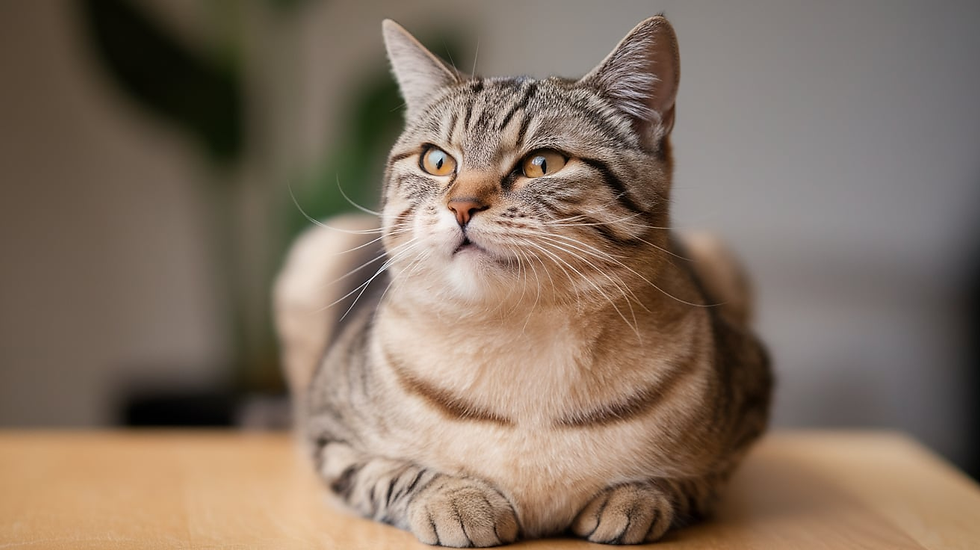Why Is My Cat Breathing Fast?
- Liam

- Aug 31, 2025
- 4 min read
Noticing your cat breathing fast can be worrying. Cats usually take smooth, quiet breaths that you barely notice. If you suddenly see your cat breathing harder or quicker than normal, it’s often a sign that something isn’t right.
Rapid breathing in cats, also called tachypnea, can have many causes—some are mild, while others are serious and require immediate vet care. As a cat parent, understanding the difference between normal and abnormal breathing can help you act quickly.

In this article, we’ll cover the possible reasons for fast breathing, what signs to watch for, and when to take your cat to the veterinarian.
What Is Normal Breathing for Cats?
To know when breathing is abnormal, it’s important to understand what’s normal.
Resting respiratory rate (RR): A healthy cat breathes about 20–30 times per minute when relaxed.
Breathing style: It should be smooth, silent, and mostly through the nose.
Effort: The chest should rise and fall gently without the belly straining.
If your cat is breathing faster than 30 breaths per minute while resting, or if breathing looks heavy, it may point to an issue.
Common Causes of Fast Breathing in Cats
Fast breathing can happen for many reasons, ranging from simple stress to serious health conditions.
Heat or exercise – Cats may pant or breathe faster after play or in hot weather.
Stress or anxiety – Loud noises, car rides, or vet visits can speed up breathing.
Pain – Cats in discomfort may breathe quickly as a response.
Respiratory infections – Colds, pneumonia, or asthma can make breathing faster.
Heart disease – Conditions like heart failure cause fluid around the lungs, leading to rapid breaths.
Lung problems – Fluid buildup, tumors, or injuries may restrict breathing.
Anemia – Low red blood cell levels force the body to breathe faster to get oxygen.
Because the causes vary widely, you should monitor other symptoms too.
Warning Signs to Watch Along with Fast Breathing
Sometimes, a cat may breathe a little faster due to excitement or play, which isn’t dangerous. But if rapid breathing comes with other signs, it’s time to worry.
Look for:
Open-mouth breathing or panting (rare and serious in cats)
Blue or pale gums
Loud breathing, wheezing, or coughing
Belly moving a lot while breathing
Lethargy or hiding more than usual
Loss of appetite or refusing food
Collapsing or struggling to move
These symptoms mean your cat may not be getting enough oxygen and needs urgent care.
When to See a Vet for Fast Breathing
If your cat’s breathing is consistently above 30 breaths per minute while resting, you should call your vet. Immediate emergency care is needed if your cat shows:
Open-mouth breathing
Blue or gray gums
Severe effort with each breath
Weakness or collapse
Your vet may do X-rays, blood tests, or ultrasounds to check the lungs and heart. Early diagnosis makes treatment more effective, especially for heart or lung conditions.
How to Check Your Cat’s Breathing at Home
You can monitor your cat’s breathing to know if it’s a one-time event or an ongoing problem.
Watch your cat when relaxed and sleeping.
Count the number of breaths for 15 seconds (one inhale + exhale = one breath).
Multiply that number by 4.
If it’s more than 30 breaths per minute, and especially if your cat looks uncomfortable, call your vet. Keeping a record helps your vet understand the pattern.
Conclusion
If your cat is breathing fast, it could be from stress, heat, or play, but it may also point to serious problems like heart disease, lung infection, or anemia. Normal resting breaths should be 20–30 per minute. Anything consistently higher, especially with other warning signs, means your cat needs veterinary attention. Acting quickly can make a big difference in your cat’s health and safety.
FAQs
What is considered fast breathing for a cat?
Normal resting breathing for cats is 20–30 breaths per minute. Anything over 30 while your cat is relaxed is considered fast. Occasional faster breaths after play or stress are normal, but constant rapid breathing at rest should not be ignored. Always check when your cat is calm to get the most accurate reading.
Can stress cause my cat to breathe fast?
Yes, stress and anxiety can cause temporary rapid breathing. Loud noises, car rides, or even new environments may make your cat breathe faster. Once your cat relaxes, breathing usually returns to normal. If it doesn’t, or if breathing seems strained, consult your vet to rule out medical problems that may be more serious.
Should I worry if my cat is panting?
Yes, panting in cats is unusual and often signals trouble. Unlike dogs, cats rarely pant unless they’re overheated, extremely stressed, or facing a medical issue. Persistent panting or open-mouth breathing can mean respiratory distress, heart disease, or another emergency. If your cat is panting and doesn’t calm down quickly, seek veterinary help immediately.
How can I check my cat’s breathing rate?
You can check your cat’s breathing rate while it’s resting or sleeping. Count the number of breaths (rise and fall of the chest) in 15 seconds, then multiply by four. This gives breaths per minute. If the number is over 30, it’s considered too high. Monitoring regularly helps you notice early warning signs.
What should I do if my cat is breathing fast at night?
If your cat is breathing fast at night while resting, count the breaths per minute. Over 30 breaths per minute suggests tachypnea. Watch for other signs like open-mouth breathing, blue gums, or weakness. If those occur, seek emergency vet care right away. Otherwise, schedule a checkup soon to investigate possible causes such as asthma or heart disease.



Comments